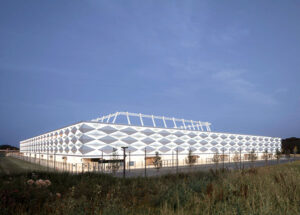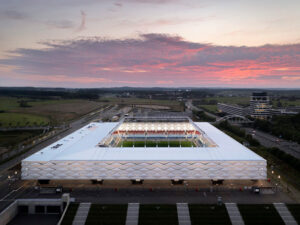
The passing counterpart for the 2022 FIFA World Cup in Qatar among Luxembourg and Azerbaijan occurred on September 1, 2021, and was the primary authority match to happen in the new Stade de Luxembourg Football and Rugby Arena. The new development of the football and rugby field toward the south of the city of Luxembourg supplanted the obsolete old.
Except for the plan for the actual arena, the job included a metropolitan master plan for the site of around 8 hectares. The new public field is situated on a piece of land that runs from east to west, with the A6 motorway toward the north and an arranged new street and tramway association with the south, the last option making a focal traffic and trade center near the arena.
The size of the pitch and the offices at the new field adhere to worldwide rules, implying that both the top UEFA arena class IV and that of the International Rugby Board (IRB) are accomplished. The arena includes a symmetrical design with a solitary level and slantingly shortened corner regions, with the show off arriving at right down to the edge of the pitch. Towards the south, a structure block obliges the useful offices for VIPs, the press, players, and authorities.
There, straight over the primary entry from the forecourt at the new Boulevard Kockelscheuer, is the admittance to the business anteroom with bordering press region and multifunctional room, which can likewise be utilized autonomously of games. The loadbearing construction of the show off rooftop comprises of a network of twofold angulated steel supports that are tightened to mirror the interior powers; the framework of braces ascends from all sides of the field and, at its most noteworthy point, conveys the pitch lighting framework.


With its 9,900 seats, the new stadium is relatively small as compared to global standards. Hence, the design was aimed at creating the atmosphere of a football arena also at this scale while also, at the same time, achieving a significant presence in the urban ensemble. To achieve this goal, the designer developed a uniform facade structure, as well as a simple geometric loadbearing structure. The diamond-shaped folded metal plate structure of the facade has a unifying effect on the overall volume of the building.
Additionally, at the second level high above the building and visible from outside, the line of lighting fixtures marks the dimensions of the pitch. This exposed site creates a dynamic and sculptural feature that can be seen by both stadium visitors and passers by. The effect is particularly noticeable at night when the pitch lighting and the illuminated facade structure radiate out to the city.






